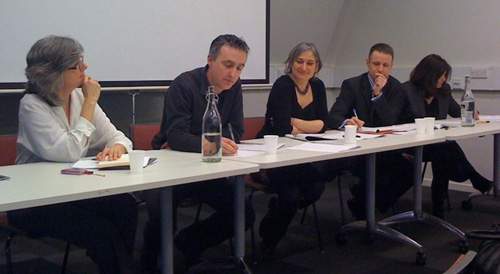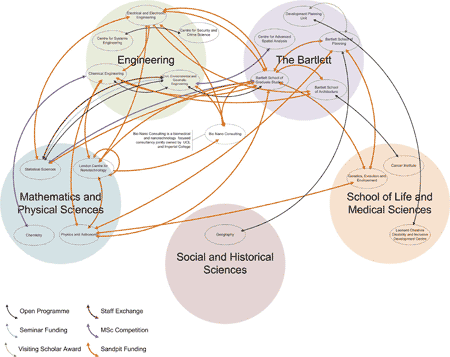 |


All News Stories
EMPA visit and presentations
November 2010
Bridging the Gaps hosted presentations from two researchers from EMPA, a swiss laboratory for materials science and technology. Researchers from EMPA have been working with the Duracoat project team, one of the research groups formed and funded at our first research sandpit (Little Green Things: Nanotechnology and Sustainability Challenges).
The first presentation, by Klaus Richter (Klaus.Richter@empa.ch), gave a general introduction to the institution and the range of work carried out by EMPA.
The second presentation, by Christian Lehringer (Christian.Lehringer@empa.ch), described the research at EMPA into the use of nano-objects in protective coatings for wood. Christian has worked with the project team on "Duracoat: Using nanoscience to protect wood".
EASST presentation
September 2010
A presentation about Bridging the Gaps was made at EASST_010, the biennial conference for the European Association for the Study of Science and Technology (EASST).
The presentation was part of a stream titled "Engineering Practice: performing a profession, constructing society". All the papers from the stream can be found here.
The Bridging the Gaps presentation is shown below.
More details about EASST can be found on their website at www.easst.net
Sense and Sustainability
May 2010
The second Bridging the Gaps sandpit was held on the 20th and 21st of May.
Bridging the Gaps held their second sandpit event, "Sense and Sustainability: Networked Sensors for the Urban Environment", bringing together researchers from Civil, Environmental and Geomatic Engineering (CEGE), Electronic and Electrical Engineering (EEE), Computer Science, Chemistry and the Bartlett Graduate School to explore the ways in which sensor networks could be used to address urban sustainability challenges.
The first-prize winning project, "What's my energy footprint?" received £10,000 to begin research into a low-cost system that would give real-time, individual feedback on energy use. Their research will investigate how data from various sources, GPS, smart energy meters, RFID tags, etc. can be fused to create a picture of an individual’s activities and the energy use associated with them.
Other funded proposals included a low-cost sensor network for air-quality monitoring that would use a mix fixed and mobile sensors, a system for increasing the energy efficiency of cloud computing by intelligently balancing the processing load across data centres, and a wireless monitoring network to improve the energy efficiency of historic properties.
Click here for more details about the 2010 sandpit.
Megalopolises and Sustainability
March 2010
The launch event for the UCL Environment Institute Report on Megalopolises and Sustainability took place on the 17th of March. Professor Mark Maslin, director of the UCL Environment Institute, introduced a a presentation by Professor Yvonne Rydin who, together with Karolina Kendall-Bush and Marianne Knight, organised the seminar series.

After Professor Rydin had outlined the findings of the report, a panel took questions from the audience about their implications.
In addition to Professor Rydin and Professor Maslin, the panel consisted of:
- Dr. Gareth Jones (London School of Economics)
- Professor Simon Joss (University of Westminster)
- Dr. Paula Vandergert (CABE)
- Shirley Rodrigues (Sustainable Development Commission)
Click here for a full list of the seminars, including lists of speakers and summary reports.
£30,000 available in the latest Bridging the Gaps Sandpit
20th–21st May — Sense and Sustainability Sandpit
Bridging the Gaps is holding a sandpit event over the 20th and 21st of May. Bridging the Gaps sandpits address areas that require collaboration between disciplines. The aim of the sandpit is to form new cross-disciplinary collaborations at UCL to carry out novel sustainable urban environments research.
This year's sandpit, Sense and Sustainability: Networked Sensors for the Urban Environment, focuses on the use of networked sensors to monitor aspects of the urban environment. The most obvious collaborations would be between the ‘digital’ disciplines (computer science, electronic and electrical engineering) and the ‘built environment’ disciplines (civil engineering, environmental engineering, architecture, urban design), but collaborations can include anyone who has a urban sustainability question that can be addressed by using sensor networks, and anyone who has an interest in sensor technology or handling the data they produce.
Research areas could be based around include, but are not limited to:- environmental pollution
- ageing infrastructure
- energy use
- water use
- transport flows
- waste management
- noise pollution
- ...
The sandpit format allows research areas and groupings of researchers to emerge from participants' interests over the course of the event. The research collaborations are then funded, based on a review by all participants, from an overall fund of £30,000.
Megalopolis Report Launch
March 2010
The Environmental Institute's Megalopolis report will be launched on the 17th of March. In the first half of 2009 the UCL Environment Institute, supported by Bridging the Gaps, held a series of seminars that addressed sustainability and the megalopolis.
The report synthesizes the results of 21 presentations and related discussion. You can find summaries of the seminars on the UCL Environment Institute website here.
Justice in the Green
March 2010
For the last two years Justice in the Green has allowed students on the MSc in Environmental and Sustainable Development course to examine the issues raised by the use and appropriation of green spaces by local residents and organisations. Justice in the Green was organised by Adriana Allen, Alex Frediani, Pascale Hofmann and Rita Valencia with support from Bridging the Gaps.
The focus of Justice in the Green is the use of Hackney Marsh and connected green spaces by the surrounding communities. To find out more please see the video or the short feedback report from Pascale Hofmann and Muki Haklay.
You can see more about Mapping Change for Sustainable Communities in this presentation from the DPU (Development Planning Unit).
Presentations from the Development Panning Unit at UCL
October 2009
As part of the Bridging the Gaps programme we run a series of events for our departmental champions. The events are a chance for researchers to meet each other and learn about the research activities in different departments.
Presentations from an event for champions hosted by the DPU (Development Panning Unit) are available below:
- Welcome to the DPU
Bridging The Gap Between Community-Led Action and Sustainable Urban Spaces
- Children Disabilities and Wellbeing:
Developing integrated methodologies to investigate well-being - Disaster Risk Reduction for Natural Hazards:
Putting Research into Practice - Built-In-Resilience:
Learning from Grassroots Coping Strategies to Climate Variability (British Council) and Negotiating Local Adaptive Capacity (BtGs) - Mapping Change:
Community use and appropriation of Hackney Marsh in the context of the 2012 Olympic Legacy - Urban and peri-urban agriculture
Winners of the 2009 MSc competition
October 2009
This is the second time we have run this competition, and once again the entries we received were of a very high standard.
The winning entries for the MSc competition are:
- Negotiating local adaptive capacity - learning from the dynamics of urban institutional and grassroots built-in resilience in Dhaka, Bangladesh which will be jointly supervised by Adriana Allen (Development and Planning Unit) and John Twigg (Aon Benfield UCL Hazard Research Centre)
- Automated estimation of cloud cover from thermal imagery which will be jointly supervised by Lewis Griffin (Computer Science) and Jan-Peter Muller (Space & Climate Physics)
- CO2 capture and conversion to a renewable fuel by means of photocatalysis on a nanostructured catalystU which will be jointly supervised by Junwang Tang (Chemical Engineering) and Zhengxiao Guo (Chemistry)
Thank you to everyone who took part in the competition.
Video and Notes from Professor Friedmann's Lecture
1 July 2009
The Bartlett School of Planning have posted notes from Professor John Friedmann's visit to UCL on their website at www.bartlett.ucl.ac.uk/planning/information/seminarsPeterHall.htm.
Professor Friedmann is one of the world’s pre-eminent planning theorists and holds posts at The University of British Columbia and University of California, Los Angeles.
While at UCL Professor Friedmann gave a lecture 'Encounters with Development Planning' and a seminar 'Varieties of Planning Experience: Towards a Globalised Planning Culture?'
You can download a video of the lecture from itunes by clicking here.
Notes from the seminar can be found here.
Professor Friedmann's Lecture, the first in the Professor Sir Peter Hall Annual Lecture Series, was part funded by Bridging the Gaps. Peter Hall is Professor of Planning and Regeneration at the Bartlett School of Architecture and Planning at UCL, and a former director of the Institute of Community Studies (Now the Young Foundation), more details can be found here.
2009 MSc competition is open
29 June 2009
The MSc competition makes 3 awards of £6,000. The competition is designed to encourage researchers from different disciplines to work together as they supervise a research student. The award of £6,000 can be used to cover the course fees for, and additional payments to, a new MSc student to carry out the research on a part-time basis.
To apply for the 2009 Competition, two academics from different departments who meet the eligibility requirements must complete the application form and email it to James Paskins (j.paskins@ucl.ac.uk) by the 21st of August 2009.
Bridging the Gaps at a Glance
10 June 2009
The Bridging the Gaps team have been taking a look back the progress of the programme so far.
The diagram below shows the links that our funding has created so far , click here or on the diagram for a larger version.
Visiting Scholar Award for Professor John Friedmann
17 March 2009
Professor John Friedmann has been awarded £3,000 under the Bridging the Gaps Visiting Scholar fund. Professor Friedmann, one of the world’s pre-eminent planning theorists, has been invited to UCL to give the inaugural Sir Peter Hall Annual Lecture. Professor Friedmann's ideas continue to shape thinking on how urban space should be planned, with an emphasis on public engagement, strategic planning of space and the impact of power relations.
Professor John Friedman, will be at UCL for "Encounters with Development Planning", a seminar that will provides an opportunity to address Professor Friedman’s contribution in the context of contemporary debates on sustainability.
Video briefings on sustainability and nanotechnology
9 March 2009
Before our sandpit event "Little Green Things: Nanotechnology for Sustainability Challenges", we thought it would be a good idea to give the participants briefings on both sustainability issues and nanotechnology.
Two videos from the briefing event are now available on this site at www.ucl.ac.uk/btg/sandpit/presandpit.html. The first video begins with "Bridging the Gaps at UCL", an introduction to the Bridging the Gaps programme from James Paskins, this is followed by "What is sustainability?", Sarah Bell's briefing on sustainability.
The second video features Gabriel Aeppli from the London Centre for Nanotechnology with "Nanotechnology: from watching single atoms to home pregnancy tests"
£30,000 awarded through Little Green Things
25 February 2009
Last week Bridging the Gaps held "Little Green Things: Nanotechnology for Sustainability Challenges" in Greenwich. The aim of the sandpit, held over the 19th and 20th of February, was to begin interdisciplinary research into the potential for addressing sustainability challenges through nanotechnology.
Nanotechnology researchers joined researchers from other UCL departments, including Architecture, Genetics and Statistics, to explore current sustainability challenges and the potential nanotechnology solutions. The sandpit proved to be a highly effective and enjoyable way to make interdisciplinary links and start exploring ideas.
In addition to mapping sustainability challenges onto potential nanotechnology solutions, the sandpit made £30,000 available to allow interdisciplinary teams to start looking at potential projects in the area.
The highest rated project, "Modelling how nano-scale processes relate to macroscale function", received £15,000. Three other projects: "Duracoat: using nanoscience to protect wood", "Pseudo-Living Material Modification" and "Novel Nanostructures for Water Purification & Treatment " each received £5,000.
More details of the sandpit will shortly be available on the Bridging the Gaps website at www.ucl.ac.uk/btg.
The sandpit was run by the Bridging the Gaps team with a great deal of help from Andrew Chilvers and Andrew Clark, the BEAMS School Research Facilitator.
If you are interested in finding out more about Bridging the Gaps, and the funding opportunities available, please contact James Paskins (j.paskins@ucl.ac.uk), or your Departmental Champion Liora Malki-Epshtein (l.malki-epshtein@ucl.ac.uk).
More details about the EPSRC Grand Challenge "Nanotechnology Solutions for the Environment" can be found at www.epsrc.ac.uk/CallsForProposals/Archive/GrandChallenges.htm.
£20,000 available through the Bridging the Gaps Mini Sandpit
5 January 2009
The deadline for applications to attend 'Little Green Things: Nanotechnology for Sustainability Challenges’, the upcoming mini-sandpit event is the 16th of January.
More details about the mini-sandpit can be found here.
Research Reports Online
19 December 2008
We have the first two reports about research that has been funded by the Bridging the Gaps programme.
- Children, disabilities and well-being: a preliminary research in India
- First National Environmental Crime Conference
Both of these activities were funded under the Bridging the Gaps Open Programme. If you have a research idea, and you need a small amount of money to get started, why not have a look at the Open Programme page.
Second Newsletter Online
27 October 2008
The latest issue of BtG News is online now. The newsletter contains details of our latest funding opportunities.
- Seminar Funding
- Staff Exchange Programme
You can view all our newsletters online here.
Launch Event video on iTunesU
1 October 2008
The video of our launch event is now available on iTunesU. You can download it by clicking here.
The video shows the talks from the launch event for Bridging the Gaps: Sustainable Urban Spaces. UCL's Provost and President, Malcolm Grant was joined by David Price (Vice Provost for Research), Sarah Bell (PI for the Bridging the Gaps programme) and Jonathon Porritt (Founder Director of Forum for the Future) to launch Bridging the Gaps: Sustainable Urban Spaces. Bridging the Gaps is an EPSRC (Engineering and Physical Sciences Research Council) funded research programme which has been designed to bring UCL researchers together to carry out interdisciplinary research in the area of sustainable urban spaces.
The launch event presentations covered the importance of research at UCL and the introduction of the Grand Challenges. The aims of the Bridging the Gaps programme were covered, as were some of the upcoming events and funding opportunities. Jonathon Porritt provided an overview of the current challenges to sustainability in today's world.
MSc Competition winners announced
2 September 2008
The standard of the entries we received for the MSc competition was so high that we have decided to fund three proposals, instead of the two that had originally been planned.
The winning entries for the MSc competition are:
- Contribution of rooftop rainwater harvesting to the water supply-demand balance in London - a case study which will be jointly supervised by Luiza Campos from Civil Environmental and Geomatic Engineering and Mike Batty from the Centre for Advanced Spatial Analysis.
- A New Hydride Fuel Cell Hybrid for Zero Emissions Vehicles which will be jointly supervised by Dan Brett from Chemical Engineering and Xiao Guo from Chemistry.
- Uncertainty in building performance simulations which will be jointly supervised by Richard Chandler from Statistical Science and Mike Davies from The Bartlett School of Graduate Studies
Thank you to everyone who took part in the competition.
The deadline for the MSc Competition is approaching
18 August 2008
If you are interested in the MSc competition, you should note that the deadline for entries is the 22nd of August.
The Bridging the Gaps MSc Competition is offering two awards of £6,000 to support interdepartmental student projects in 2008/09.
The award is intended to cover a student’s course fees, with any excess being paid as a stipend to the student. The competition aims to build interdisciplinary links between supervisors, and introduce MSc students to interdisciplinary research.
To enter, a pair of UCL staff must identify an area of urban sustainability research that crosses disciplines, has the potential to produce new findings, and can be investigated in a project suitable for an MSc student.
Entries must come from a pair of supervisors from different departments at UCL, and at least one of the entrants must be an early career researcher (up to Reader level).
Find out more about the MSc competition and download an application by clicking here.
Success in the Open Programme
18 August 2008
The first two pairs of researchers have been funded under the Bridging the Gaps Open Programme.
The first award, for £996.80, has been made to Liora Malki-Epshtein from Civil Environmental and Geomatic Engineering and Serge Guillas from Statistical Science. They plan to work together to develop a model that relates the dispersion of traffic-related pollution in an urban street canyon to traffic density. Potential benefits of this work are a reduction in the impact of pollution on human health at street level, and increases in urban energy efficiency. The award from Bridging the Gaps will be used to buy out their time, giving them time to develop a research proposal.
The second award has been won by Alexandre Frediani from the Development Planning Unit and Jean Trani from the Leonard Cheshire Disability & Inclusive Development Centre have been awarded £1000. The money will be used to allow them to visit Project Why in New Dehli and to learn about the work that is being done in developing countries to provide sustainable urban spaces for people with disabilities.
The Bridging the Gaps Open Programme makes awards of up to £1,000 to support cross-disciplinary research into sustainable urban spaces. Go to the Open Programme page to find out more and apply online.
Our first newsletter is online
18 August 2008
You can download or view the first issue of the Bridging the Gaps newsletter here.
All News Stories
Disclaimer | Accessibility | Privacy | Advanced Search | Help

